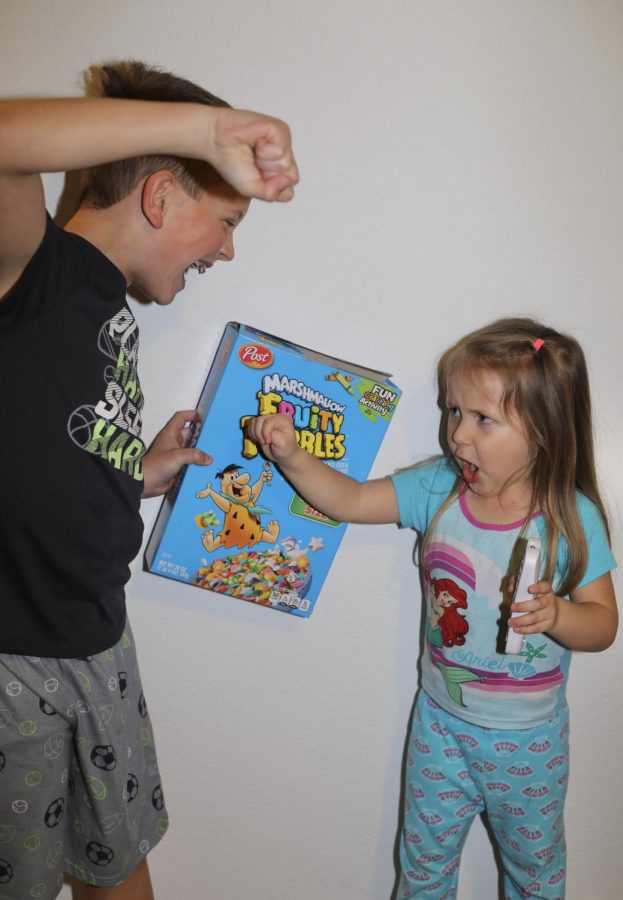Quarantine quarrels
Sibling bickering develops life skills
photo credit: Shelby Perry
Sibling rivalry \\ My younger brother and sister bother me and the rest of the house as they banter over remote privileges and the last bit of cereal. While my parents painted the bickering as “ridiculous,” I had quite the contrasting opinion. Let them fight, it’s good for them.
January 25, 2021
A year ago, families would cringe at the thought of being shoved into their houses together with nowhere to go, for months on end. Fast forward to today, and that’s the unfortunate reality.
In March of last year, the COVID-19 pandemic hit, and it’s safe to say it was far from a soft blow. A nation-wide quarantine was enforced, unlike anything that any of us had seen before. However, for some larger-sized families, what was going on inside the walls of their homes felt just as chaotic as what was going on outside.
Cramming several kids inside together would typically be seen as a recipe for disaster, and a whole lot of bickering. Only a few weeks in, I heard my mom on the phone with a friend, “I just don’t get it,” she said. “They never fight this much, and it’s not like I can separate them. All this time together cannot be good for them.” As one could assume, forcing my younger sister and brother into close-quarters for weeks had caused their already-frequent arguing to increase noticeably. However, while my parents painted the bickering as “ridiculous,” and spent hours on parenting sites researching ways to mitigate it, I had quite the contrasting opinion. Let them fight, it’s good for them.
A majority of parents and adults view arguments and fights between siblings to be almost entirely negative, and as purely a product of childish pettiness and excessive amounts of time spent together. However, I’d argue that most fail to address that a healthy amount of sibling conflict has a variety of beneficial effects on children that carry over into adulthood. Life skills are formed, such as problem solving and conflict resolution, the ability to compromise, and the maturity to recognize one’s own mistakes and apologize effectively. These are all valuable life lessons that can be adopted at a young age through minor sibling disagreements.
I grew up often sharing a bedroom with my brother. Having only a two-year age difference, being different genders, and spending a majority of our time together, we were prone to frequent arguments. These ranged from a quick dispute over the bigger bowl of Lucky Charms, to a full-on sparring match over who got T.V. remote privileges for the night. It drove just about everyone crazy. But at the end of the day, we’d fight it out, shed a tear or two, and finally one of us would decide the prize wasn’t worth the chase and give up. The important part was, we were brother and sister. And while we drove each other crazy, we also lived together, and would for a very long time. So with that, we both learned to apologize. We learned to pick our battles, and to consider which things were really worth the tears. I can’t say we never fought over the same things twice, but I can sure tell you we don’t fight over them now. Or much of anything anymore. Maybe it’s because we learned the bowl of Lucky Charms and T.V. remote just weren’t worth it, or because he finally realized that I would always win. Either way, consider the lesson learned.
Of course, boundaries are always important, as kids shouldn’t maliciously hit or scream at each other, it’s also perfectly healthy to allow kids to argue and solve the minor conflict over who gets to ride the imaginary bicycle, or who gets the last pink cupcake. A good amount of parental intervention to teach them the lesson behind their actions should always be encouraged, however, encouraging them to problem solve, disagree, and eventually make amends on their own can be just as beneficial in the long run. So yes, though hearing siblings argue over the Spiderman toy in the backseat isn’t exactly music to anyone’s ears, just think about the fact that one day when they’re older, they won’t be calling about how they got fired because they got in a disagreement with their boss and didn’t know how to de-escalate the situation, or because they didn’t know how to apologize and make amends with their spouse and now they need a place to stay. What may be inconvenient now, could result in the formation of skills that will benefit children throughout their lifetime.




Zack Dorsey • Mar 15, 2021 at 11:18 am
I fight with my little brother all the time and know i found out its a good thing!
Triniti • Mar 5, 2021 at 4:29 pm
This piece is incredible! Even though i do not have siblings, this helped me see what it would be like during quarantine to have one!
Anne • Mar 5, 2021 at 10:20 am
SO TRUE!!!
Bryanna Turner • Mar 5, 2021 at 10:07 am
I really enjoyed your perspective on this topic. I also enjoyed all the examples that you used to make this story flow. Well done!
Amanda Rios-Diaz • Mar 4, 2021 at 10:15 am
I like how the 1 sentence captures your attention quickly. I also like how on much I can relate to this story.